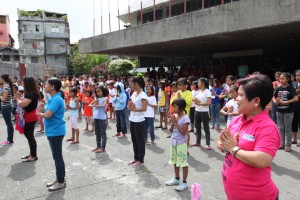
Some 440 children from the different centers and institutions of the Department of Social Welfare and Development (DSWD) and children-beneficiaries of the Modified Conditional Cash Transfer (MCCT) program are given the opportunity to sing special songs for Pope Francis during his send-off on Monday, January 19, after the five-day Papal visit.
Among these children are those who are abandoned and currently being taken care of at the Reception and Study Center for Children (RSCC), children with mental disabilities who are undergoing rehabilitation at Elsie Gaches Village (EGV), and streetchildren who were formerly using illegal drugs and are now being treated at the Haven for Children (HC).
Abandoned, abused, and exploited children from the Nayon ng Kabataan (NK) and Marillac Hills (MH) are also joining the send-off activity, as well as children with disabilities from the National Vocational Rehabilitation Center (NVRC). These children were given a new lease on life through different rehabilitation programs and services.
“They have been practicing since December last year to perfect their performance,” according to DSWD Secretary Corazon Juliano-Soliman as she showed to media practitioners a group of streetchildren practicing their performance.
“Pope Francis reminds us that we should take care of these unfortunate and disadvantaged children. This is what we continue to do in our centers and institutions,” the Secretary added.
Children’s wishes
Among those who will see the Pope up close and personal when they send him off on Monday are Mark John Samson and Lorenzo Dizon, both beneficiaries of the MCCT.
“Masaya ako dahil isa po ako sa napiling kakanta kay Pope Francis sa pag-alis nya sa Lunes (I am happy because I was one of those chosen to sing for Pope Francis when he leaves on Monday),” enthused Mark John Samson, 11, and a third grader at the Maceda Elementary School, Sta. Mesa, Manila.
“Kung makakaharap ko po si Pope Francis, ang una ko pong hihilingin sa kanya ay ipagdasal na makatapos ako ng pag-aaral (If I’m given a chance to talk to Pope Francis, I will request him to pray that I may finish my studies),” the boy added.
Mark John, the eldest of six siblings is a beneficiary of MCCT since 2013.
Their father died leaving their mother, a street sweeper, to care for her children aged six,five, four, three and a one year-old baby.
Meanwhile, Lorenzo Dizon, 11, from Lawton, Manila and an MCCT beneficiary since December 2012 said, “Masaya po ako sa pagbisita ni Pope Francis (I am happy Pope Francis visited our country).”
A fourth grader from Mabini Elem. School, Lorenzo shared he wants the Holy Father to pray for the reunification of his family
“Ang hihilingin ko ay ipagdasal nya na mabuo ang aming pamilya dahil hiwalay po ang aking mga magulang. May ibang pamilya na po ang akin tatay (I will request him to pray that our family be whole again, since my father has another family now),” he sighed.
“Gusto ko din po na makatapos ng pag-aaral para makatulong sa aking nanay (I also want to finish my studies so I can help my mother),” the boy added.
Christine Materiano, 15, a wheelchair-bound girl who is currently a resident of Elsie Gaches Village, is, likewise, grateful for having this opportunity to see Pope Francis face to face on that day to bless her as well as the other children.
The children felt blessed and expressed their gratitude to DSWD for giving them this once-in-a lifetime experience of being with the Pope.
Getting children off the streets
As of December 31, 2014, 218,377 families are covered by Modified Conditional Cash Transfer (MCCT), which is designed to maximize the reach of the Conditional Cash Transfer (CCT) or Pantawid Pamilyang Pilipino Program to help families and children in difficult circumstances overcome their situation.
This number includes Families in Need of Special Protection (FNSP), Homeless Street Families (HSF), and Extended Age Coverage Program for Children 15-18 years old (EAP) nationwide.
Around 2, 479 families are covered by the MCCT-HSF since it started implementation in the National Capital Region (NCR) in 2012.
According to Sec. Soliman, the MCCT-HSF covers poor families who were not included in the regular Pantawid Pamilyang Pilipino Program because of their mobile lifestyle and indefinite residence.
It provides a complete package of assistance to street families which includes responsive housing programs, with access to social services and economic opportunities for the improvement of their living conditions.
The MCCT also aims to bring back children to schools and facilitate their regular attendance in facility-based education including access to Alternative Education and other special learning modes; facilitate availment of health nutrition services through regular visits to the health center and enhance parenting roles through attendance to Family Development Sessions (FDS), get children away from the streets to more suitable, decent and permanent homes and reunite with their families, and to mainstream families with children in need of special protection for psychosocial support and better family functioning through the Pantawid Pamilya.
“Ang kalsada ay hindi ligtas sa bata. Pagtulungan nating makapunta sila sa ligtas na lugar (The streets are not safe for children. Let us work together to bring them to safe places),” Sec. Soliman urged the Department’s partners and local government units.
“Inter-agency efforts are being done to rescue and provide safe havens for them. The bottom line is we must not let them stay on the streets,” she emphasized. ###


